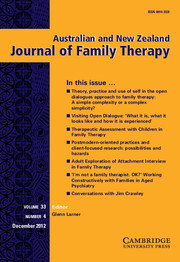Article contents
Captured by the Game: Might a Focus on the ‘Therapeutic Relationship’ Diminish the Attention We Give to the Client's Intimate Network?
Published online by Cambridge University Press: 02 March 2012
Abstract
A recent project sought to clarify how psychotherapists and mental health workers understand psychosocial health and pathology. In this enquiry, I paid particular attention to the client's interpersonal networks: did the professionals actively consider, and if so to what extent, ‘intimate social and family relationships’ in constructing their understanding of the presenting problem and in the process they used for goal setting. Twenty-two semi-structured interviews were undertaken, eleven with psychotherapists and eleven with mental health workers. Across both groups, interviewees tended not to see their clients as embedded, relational entities, but primarily, often quite exclusively, as autonomous beings. Second, inter - viewees accorded a high value to the importance of ‘the therapeutic relationship’. Is it possible that the emphasis practitioners place on ‘the therapeutic relationship’ has the effect of marginalising the attention that is given to the client's significant-other network?
- Type
- Articles
- Information
- Australian and New Zealand Journal of Family Therapy , Volume 29 , Issue 1 , 01 March 2008 , pp. 25 - 33
- Copyright
- Copyright © Cambridge University Press 2008
- 1
- Cited by


